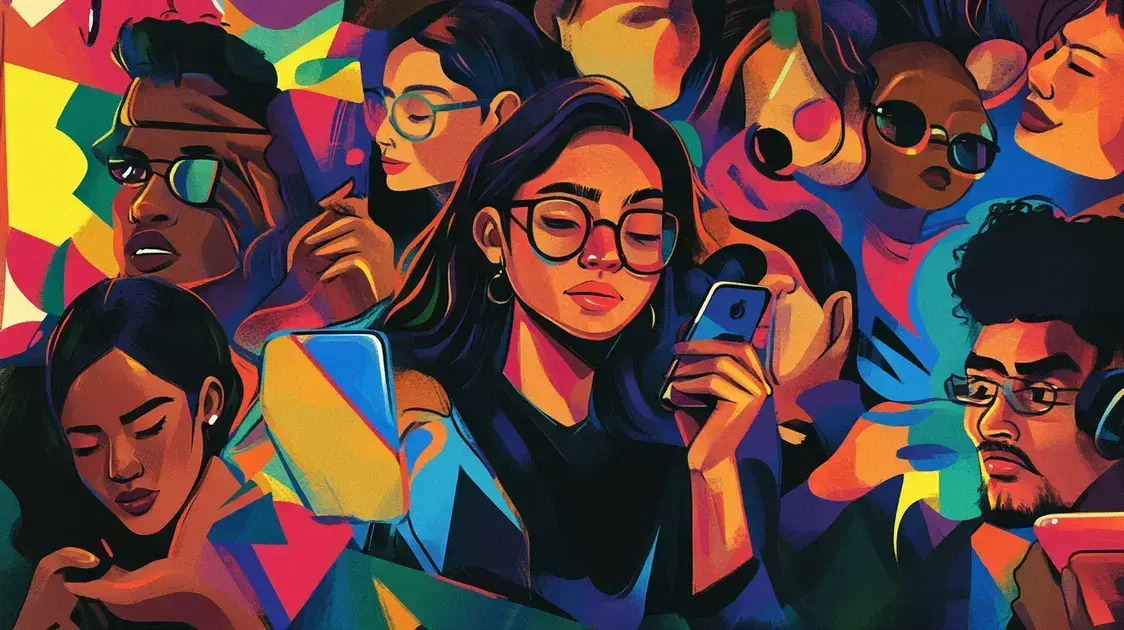Social connection plays a vital role in mental and emotional well-being. In today’s fast-paced, digitally-driven world, maintaining strong relationships is essential for support and shared experiences that enhance our lives.
Building these connections improves resilience, reduces stress, and boosts physical health. Whether with family, friends, or the community, strong relationships are key to leading a fulfilling life.
In a world where technology often replaces in-person interactions, prioritising social connections is crucial for emotional well-being. Nurturing meaningful relationships creates a solid support network that contributes to overall happiness. Keep reading to explore practical ways you can strengthen your social ties and improve your life.
Understanding Social Connection
Understanding social connection is key to recognising its vital role in our lives. Social connections consist of the relationships we form with family, friends, colleagues, and community. These connections nourish our sense of belonging and offer emotional support in times of need.
The Nature of Social Connection
Social connections can vary in depth and intensity. They range from casual acquaintances to close friends and family bonds. Each type of connection plays a unique role in our well-being.
Factors Influencing Social Connection
Several factors can influence how we connect with others. Personal experiences, culture, and individual personality traits all contribute. For example, someone who is extroverted may seek out connections more actively than an introverted person.
Why Is It Important?
Understanding social connection is critical because it directly impacts our mental and physical health. Positive relationships can promote happiness and reduce stress, while loneliness can lead to various health issues.
The Impact of Technology
In today’s digital age, technology has transformed how we form social connections. Social media platforms help maintain long-distance relationships, yet they can also lead to superficial connections that lack depth.
Encouraging Healthy Connections
To foster genuine connections, it is essential to engage in meaningful conversations and spend quality time with others. This can involve sharing experiences, being present, or simply listening.
The Benefits of Strong Social Ties
The benefits of strong social ties are significant and multi-faceted. Having strong connections with others can lead to improved physical health, emotional well-being, and personal growth.
Enhanced Mental Health
People with strong social ties often experience lower levels of stress and anxiety. Having friends or family to turn to can make tough times easier to bear. Sharing experiences and feelings with others promotes mental clarity and positivity.
Support During Challenges
Strong social bonds provide crucial support during difficult times. Friends and family can offer comfort and help us navigate challenges, whether personal or professional. This support can make a big difference in our ability to cope.
Increased Happiness
Having a solid network of support can significantly boost happiness. Interacting with loved ones, sharing laughter, and creating memories together fosters joy and contentment in life.
Better Physical Health
Research shows that individuals with stronger social connections often enjoy better health. Social support can lead to a healthier lifestyle, including regular exercise, better nutrition, and lower risk of diseases.
Personal Growth and Learning
Engaging with diverse groups enhances learning and personal development. It opens doors to new perspectives and ideas, helping us grow as individuals.
A Sense of Belonging
Strong social ties provide a sense of belonging, making individuals feel connected to their community. This bond can foster a positive identity and a sense of purpose.
How Social Connection Affects Mental Health

How social connection affects mental health is an essential topic that highlights the significance of strong relationships. Numerous studies have shown that social ties play a critical role in shaping our mental well-being.
Reducing Feelings of Loneliness
Regularly connecting with others can significantly lower feelings of loneliness. When individuals build and maintain strong relationships, they find a support system that helps combat isolation.
Boosting Self-Esteem
Healthy social connections can enhance self-esteem. Positive feedback and encouragement from friends and family make individuals feel valued and appreciated, contributing to better mental health.
Promoting Resilience
Supportive relationships help people bounce back from challenges. Having someone to talk to during difficult times can provide perspective and support, making it easier to cope with stress.
Encouraging Healthy Habits
Social connections often encourage healthy lifestyle choices. Friends and family who engage in fitness or wellness activities together can inspire each other to maintain these habits, promoting overall well-being.
Managing Stress
Building and nurturing social ties can decrease stress levels. A close connection provides comfort and a sounding board, reducing anxiety and fostering emotional stability.
Improving Overall Well-Being
Strong social networks contribute to better mental health outcomes. They provide a sense of belonging and community, which can enhance happiness and life satisfaction.
The Role of Community in Social Connection
The role of community in social connection is vital for our personal and collective well-being. Communities provide a network of relationships that help individuals feel connected and supported.
Creating a Sense of Belonging
Being part of a community fosters a sense of belonging. Individuals often identify with their community, which can boost their self-esteem and provide a strong foundation for social ties.
Support During Difficult Times
Communities offer essential support during challenging moments. Whether through local organisations, support groups, or simply neighbours, having a network to rely on can significantly ease stress and promote resilience.
Encouraging Participation and Engagement
Active participation in community activities helps strengthen social connections. Engaging in local events, clubs, or volunteering encourages people to meet others and develop friendships.
Facilitating Resource Sharing
Communities create opportunities for resource sharing, reinforcing social ties. Members can share information, skills, and assistance, creating a reciprocal environment where everyone benefits.
Promoting Safety and Well-Being
A close-knit community often enhances feelings of safety and security. Knowing that others care and look out for one another creates a protective atmosphere that can positively influence mental health.
Driving Local Change
Communities have the power to drive social change. When individuals connect over common interests or concerns, they can work together to address issues, creating a more significant impact than solitary efforts.
Building Lasting Relationships
Building lasting relationships is essential for creating strong social connections. These relationships require effort, time, and commitment.
Be Open and Honest
Fostering trust begins with being open and honest. Share your thoughts and feelings with others. Vulnerability can strengthen bonds and make relationships deeper.
Communicate Regularly
Regular communication is vital for maintaining healthy relationships. This can be through calls, texts, or face-to-face meetings. Consistent contact helps reinforce connections over time.
Show Appreciation
Expressing gratitude is key to building lasting bonds. A simple thank you or a thoughtful gesture can show others that you value them. This creates a positive atmosphere in any relationship.
Invest Time
Quality time together can strengthen relationships. Make time for friends and loved ones. Share experiences like meals, activities, or outings, which can help build memories together.
Be Supportive
Being there for others during good and bad times reinforces the relationship. Support from friends or family shows them they are not alone, which fosters deeper emotional ties.
Resolve Conflicts Respectfully
Disagreements are natural in any relationship. Address conflicts calmly and respectfully. Open discussions about issues and finding common ground can significantly strengthen relationships.
Overcoming Barriers to Connection

Overcoming barriers to connection is essential for building and maintaining strong social ties. Many challenges can hinder our ability to connect with others, but there are ways to address them successfully.
Identifying Personal Barriers
Understanding your personal barriers is the first step. This might include fears of rejection, feelings of inadequacy, or past negative experiences. Recognising these challenges can help you work through them.
Developing Social Skills
Improving your social skills can boost your confidence in forming connections. Practise active listening, effective communication, and empathy. Joining clubs or workshops can be a great way to develop these skills in a supportive environment.
Using Technology Wisely
While technology can create distance, it can also bridge gaps. Use social media and communication apps to maintain contact and reach out to potential friends. However, balance these with face-to-face interactions to strengthen connections.
Overcoming Distance
Geographic barriers can make it difficult to connect, but planning regular meet-ups or video calls can help. Being proactive about maintaining long-distance relationships shows commitment and effort.
Addressing Time Constraints
Busy schedules can hinder our ability to connect. Prioritising time for social interactions, even if brief, can foster stronger connections. Schedule regular catch-ups, even if they are virtual.
Seeking Support
Sometimes, reaching out for support from friends, family, or professionals can help. They can provide encouragement and strategies for overcoming barriers. Discussing your feelings with others can also relieve anxiety around social interactions.
Cultivating Social Skills
Cultivating social skills is essential for building and maintaining strong connections with others. These skills help us interact effectively and foster positive relationships.
Practice Active Listening
Active listening means fully focusing on the speaker. This shows that you value their thoughts and opinions. Nod, maintain eye contact, and ask questions to engage actively in the conversation.
Improve Non-Verbal Communication
Body language, gestures, and facial expressions are crucial in conveying messages. Be mindful of your posture and expressions. A warm smile can make a significant difference in social interactions.
Work on Your Empathy
Empathy involves understanding and sharing the feelings of others. Practise putting yourself in someone else’s shoes. This will help you respond more compassionately and build stronger connections.
Enhance Your Conversation Skills
Conversations should flow naturally. Start with small talk to ease into deeper discussions. Practise sharing your thoughts while encouraging others to express theirs.
Join Social Activities
Participating in community events, clubs, or groups can help you meet new people. These activities provide opportunities to practise your social skills in a real-world context.
Seek Feedback
Ask friends or family for feedback on your social interactions. Understanding how others perceive you can guide your growth in social skills and help identify areas for improvement.
Digital Age and Social Connection
The digital age and social connection have drastically changed how we interact with one another. While technology offers new ways to connect, it also presents challenges.
Expanded Reach
The internet allows us to connect with people from all over the world. Social media platforms enable friendships beyond geographical boundaries, fostering a sense of global community.
Instant Communication
Texting, video calls, and messaging apps have made communication quick and easy. Friends and family can stay in touch, share experiences, and support one another in real-time.
Potential for Superficial Connections
Despite the advantages, digital connections can sometimes lack depth. Online interactions may not replace face-to-face relationships, leading to loneliness despite being “connected.”
Information Overload
The digital age bombards us with information, making it hard to focus on meaningful connections. It’s essential to filter out distractions and engage deeply with those who matter most.
Building Online Communities
Online forums, groups, and networking sites can help people with similar interests connect. These platforms allow individuals to share knowledge, support each other, and create friendships based on common passions.
Maintaining Balance
It’s crucial to balance online and offline interactions. Building strong relationships in person remains vital for emotional well-being. Make a conscious effort to spend time with loved ones offline.
FAQ – Frequently Asked Questions about Social Connection
How does social connection impact mental health?
Social connection reduces feelings of loneliness and boosts self-esteem, leading to better mental health outcomes.
What are the benefits of strong social ties?
Strong social ties provide emotional support, increase happiness, and promote better physical and mental health.
How can I build lasting relationships?
Building lasting relationships involves open communication, showing appreciation, and spending quality time together.
What barriers can hinder social connection?
Barriers include personal fears, geographic distance, lack of time, and social anxiety, but these can be addressed with intention.
How can I cultivate my social skills?
Practise active listening, improve non-verbal communication, and engage in social activities to enhance your social skills.
What is the role of community in social connection?
Communities create a sense of belonging, offer support during tough times, and encourage social engagement.
Check out our article on Daily Life Tips to discover simple and effective ways to improve your routine and boost productivity.
